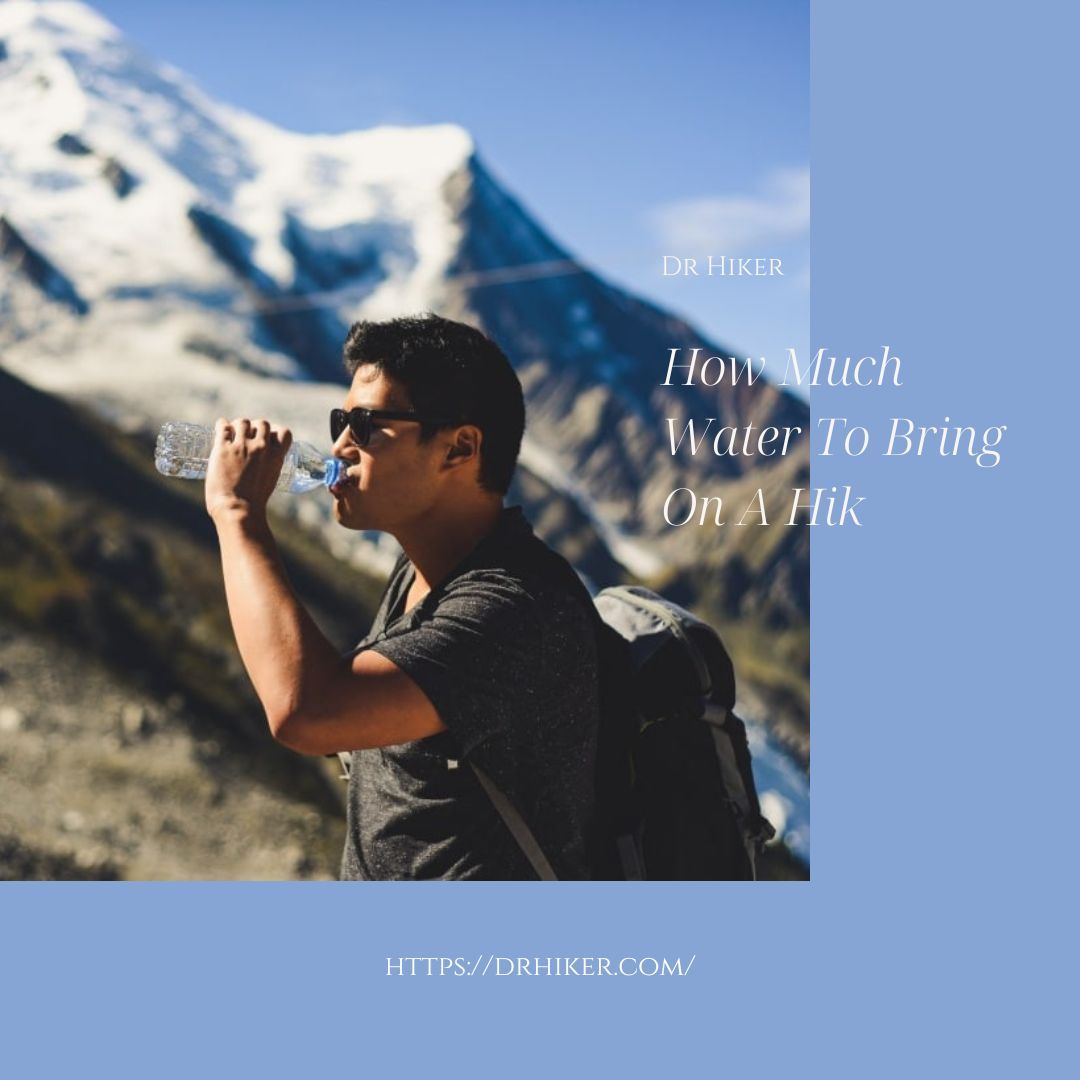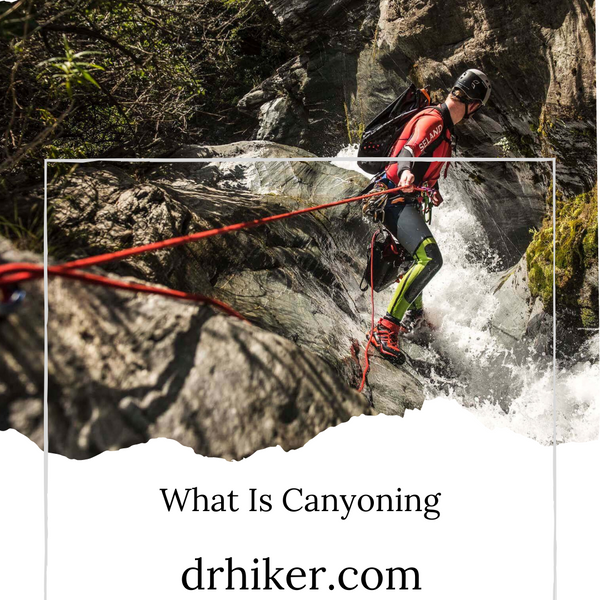As a general rule of thumb, an adult needs 2 cups of water for an hour of hiking, and if you have children along, 1 to 2 cups of water are required for every hour of hiking. However, water needs can vary depending on different factors such as weather, personal thirst, days of hiking, and water availability on the trail.
What Factors To Consider When Backpacking Water On A Hike?

Generally, 500ml water is sufficient for an hour of hiking, but many factors influence the needs. Body weight, composition, and age are some biological factors that help determine water requirements by the body. Other physical and chemical factors are listed below:
Water Sources Available on Trail
When backpacking, you must do pre-trip research about the trail and water resources available on the way. Though you can bring a filled water bottle and drink when hiking, with available sources, you can fill it again.
If water sources are abundant, you do not need to worry about carrying water, but if there is less supply, you will need to keep yourself hydrated by any means.
Hiking Duration
You don’t just need to count the overall mileage; the total duration you plan to stay on the trail also plays a significant role in deciding how much water to bring. On some hiking trails, the mileage is less but steepness, and rugged terrain is higher. The elevation and such trails require extra effort to hike, ultimately increasing the body’s water needs.
Naismith’s rule is quite helpful in calculating water needed for hiking, such as an hour for three or more miles of hiking with an additional hour for 600 meters of scent. For a 9-mile hike, 900 meters of ascent is required in a region of 4.5 hours.
Weather Conditions
Weather plays a major role in helping find water needed by the body when hiking. Your body will sweat more when you hike in warm weather than in cold weather. However, the perspiration level also varies among individuals as some sweat more than others, depending on their metabolic rate.
You can also sweat even in cold weather, wearing warm clothes and walking continuously. If you hike in 60 degrees Fahrenheit weather without much perspiration and availability of reliable water sources, carry 1.4 liters of water for every 2 hours of hiking.
Exertion on Trail
The condition or nature of the trail also decides how much strain or struggle you will put when hiking and your water needs. If the trail requires a lot of bodywork, your body will produce more sweat and need more water to replace the lost body fluids.
So, planning for the trail or hiking terrain is advised before deciding how much water you will carry. Drink 0.5 liters of water in an hour for each slight elevation if you are hiking on a mellow or well-maintained trail. If you move on a thousand feet of accent or hike on a rugged trail, keep an extra half liter of water for every two hours of hiking.
Personal Body’s Needs
No one's body has the same need for food and drink. The physiology of every individual differs from others. If you can stay well without drinking water for hours, your companion may find it exhausting to walk even for an hour without water.
Considering your body weight and age, you must keep 1 to 2 liters of drinking water every two hours of hiking.
How Much Water To Bring On A Hike? Calculate It

On average, for an hour of hike, drinking 1 to 2 liters of water is recommended. If you have children with you, they will need 1 to 2 cups of water for an hour of hiking. To simply calculate it, if you hike for 5 hours, bring 10 cups or 2.3 liters of water. This can vary depending on the factors we have described to determine the body's water needs.
To stay hydrated on the trail, drink water before you start hiking but keep it up to 17 to 20 ounces. Drink water during an hour of hiking and after you have finished hiking to ensure your body is fully hydrated.
Hiking under shady and cool places will cause less exhaustion, and your body will need less water. But walking under the direct sun will drain you, and you will need to drink a liter of water every two to three hours.
Note: Though staying hydrated is the most important thing you should remember during hiking, avoid overhydration at any cost, as it will cause more trouble.
What Is The Best Way To Carry Water On A Hike?

Once you decide on the quantity of water to bring on a hike, the question of how to carry water arises. Both are good gear whether you use a hydration pack or simply bring a water bottle. If the terrain is rugged and rough, you will need to bring plenty of water, but a water bottle is sufficient for a short and easy trail. Here are a few gears you can use to carry water on a hike:
Water Bottles
You can easily find water bottles in varying types and sizes useful for hiking. You should keep a bottle made of sturdy material to avoid damage during hiking. A stainless steel or hard plastic bottle is ideal for hiking.
Water Bottle & Backpack (Hydration Pack)
A hydration pack is great for carrying additional supplies such as a first aid kit, maps, and a compass. It helps you stay hand-free on uneven terrain.
Water Bladder
Water bladders are also adjustable to the body and ensure comfortable walking. The bladder has breathable fabric, mesh pockets to hold several items, and strong nature to make them last for years.
How to Carry 3 Gallons of Water?
The ideal way to carry 3 gallons (11 liters) of water is in your backpack by balancing 3 liters of water in a hydration bladder, 3 to 4 liters in flexible bags, or 1 liter in two to three water bottles.
Safety Tips To Stay Hydrated On-Trail When Hiking
Here are a few safety tips you must consider to stay hydrated when hiking:
- Before you head out for hiking, hydrate yourself by drinking 12 to 16 ounces of water.
- You do not need just water; pack electrolytes or minerals in the form of gel or tablets or sachet of salt to avoid a decline of sodium level in the body.
- Take a few sips of water instead of chugging when you take a water break.
- Wear breathable clothes to avoid excessive sweating. You must bring enough water to replenish lost body fluids.
- Start hiking early in the morning to avoid exhaustion, dehydration, and heat stroke in the midday sun.
- Bring snacks that can fulfill the body's need for sodium and potassium.
- Set a timer and drink after every alarm to stay hydrated. You must drink water even if you are hiking in the cold.
Final Thoughts
It can be dangerous to hike without sufficient water, leading to dehydration and exhaustion. To avoid any issues, you must consider all the factors we have discussed, heat, location, weather, and water sources.
Drink water whenever you feel less energetic, and your mouths get dry. But also notice the signs of overhydration, such as fatigue, headache, and nausea. We hope the instructions and tips help you stay healthy on your hiking trip.








